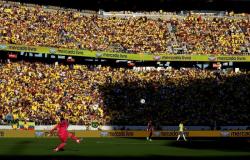Below is the press release from the Municipality of Bitonto:
«Hot air is arriving in Puglia which will lead to a thermal increase with maximum temperatures expected between 34 and 37 °C.
The latest bulletin issued by the alert system for the prevention of the effects of heat waves published by the Ministry of Health indicates for today a level 1 risk (code yellow), which today, 20 June 2024, will rise to level 2 (code orange).
Level 2, corresponding to high temperatures and weather conditions that can have negative effects on the health of the population, in particular in susceptible population subgroups (elderly people, infants and children, people with chronic diseases, pregnant women, people with mental disorders, people with reduced mobility and/or who are not self-sufficient, people hosted in healthcare residences, people who regularly take certain types of medicines, people who use alcohol and drugs, people, including young people, who exercise or carry out intense work outside open air, people with disadvantaged socio-economic conditions) involves alerting health and social services.
In Bitonto, peaks of 35-36° are expected for both June 20th and 21st, with the heat remaining until Saturday 22nd. The municipal Department for Social Policies, in collaboration with the Italian Red Cross and the Giovanni XXIII Foundation , has planned the reactivation of the emergency hot emergency point in the premises of the Foundation’s listening centre, which last year was home to the “SOStenere” socio-health center in via Matteotti 4. The emergency point will be operational tomorrow 20 June from 5pm to 7pm and Friday 21 June from 10am to 12pm.
These are the general recommendations dictated to the population by the Ministry of Health to reduce the risks related to level 2 heat waves:
>> avoid exposing yourself to heat and direct sun during the hottest hours of the day (between 11.00 and 18.00): high temperatures and humidity can cause symptoms associated with heat and burns;
>> avoid particularly crowded areas, in particular for very young children, the elderly, people with asthma and other respiratory diseases, non-self-sufficient or convalescent people. Go to public places such as parks and gardens during the cooler hours of the day;
>> go out in the cooler hours;
>> spend the hottest hours of the day in the coolest room of the house, bathing often with fresh water;
>> ensures adequate air exchange: natural ventilation determines better air exchange than mechanical ventilation;
>> use the air conditioner correctly. If you only have a fan, use it following some precautions;
>> wear light, light clothing made of natural fibers (e.g. cotton, linen), cover your head with a light-coloured hat and use sunglasses;
>> protect your skin from sunburn with sunscreens with a high protective factor;
>> drink liquids, moderating the intake of carbonated or sugary drinks, tea and coffee; also avoid too cold drinks and alcoholic beverages;
>> follow a light diet, prefer pasta and fish to meat, avoiding processed and spicy foods; consume lots of fresh vegetables and fruit; pay attention to the correct storage of perishable foods (e.g. dairy products, meat) as high temperatures can favor the proliferation of pathogenic germs causing gastrointestinal diseases;
>> if you take medications, do not independently suspend ongoing therapies but consult your doctor for any adjustments to your drug therapy;
>> pay attention to the correct storage of medicines, keep them away from heat sources and direct sunlight and place those that require a storage temperature no higher than 25-30°C in the refrigerator;
>> if the car is not air conditioned, avoid traveling during the hottest hours of the day (11.00-18.00); don’t forget to bring sufficient supplies of water with you in case of unexpected queues or queues;
>> do not leave non-self-sufficient people, children and the elderly, even if for a short time, in the car parked in the sun;
>> make sure that sick and/or bedridden people are not covered too much;
>> offer assistance to people at greater risk (for example elderly people who live alone) and report to the social and health services any situations that require intervention: in elderly people an alarm bell is the reduction of some daily activities (moving around home, dressing, eating, going to the bathroom regularly, washing) which may indicate a worsening of your health;
>> if you have symptoms of heat-related disorders, contact a doctor.
We would also like to remind you that, based on the ordinance of the President of the Puglia Region, working in conditions of prolonged exposure to the sun is prohibited for the entire regional territory until 31 August 2024, i.e. from 12.30 to 16.00, in the areas or zones concerned. from carrying out work in the agricultural sector and only on days and times with a “HIGH” risk level, detectable from the risk map available on www.worklimate.it/sceltamappa/sole-attivita-fisica-alta/ (referring to “workers exposed to the sun” and clicking “intense physical activity” with reference to the “12.00” time slot).





